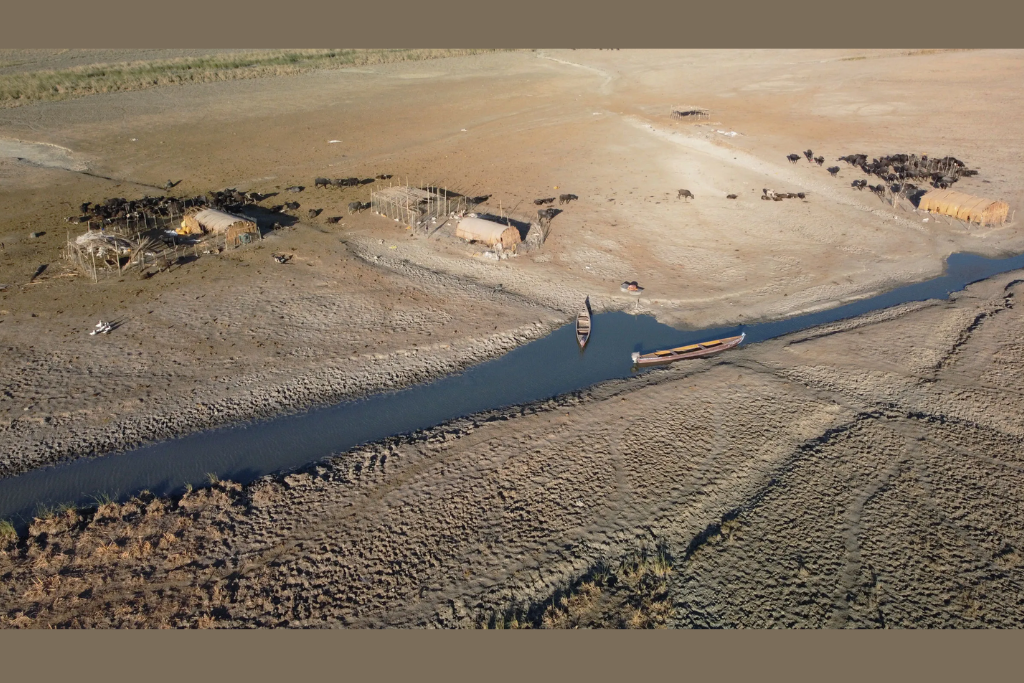Mesopotamia, known as the Fertile Crescent and the cradle of civilization, is facing an unprecedented crisis. Once an ancient land thriving with abundant waterways and fertile soil, the region is now succumbing to the devastating impacts of climate change and desertification. The rivers that nourished this historic land are drying up, leaving behind a barren moonscape and a population struggling to survive. As the world witnesses this unfolding environmental catastrophe, it serves as a stark warning of the consequences of unchecked water mismanagement and the urgent need for global action to address climate change.
The Demise of the Land Between Rivers
The name Mesopotamia itself means “the land between rivers,” referring to the Tigris and Euphrates rivers, which have been the lifeline of the region for millennia. These rivers once facilitated the flourishing of Civilization. with the invention of the wheel, irrigation systems, and the earliest known writing system. It was a watery paradise, with bountiful harvests and vibrant cities. However, today, the rivers have dwindled to a mere trickle, and almost 40% of Iraq, an area roughly the size of Florida, has succumbed to encroaching desert sands.
Climate Change and Water Scarcity Causes of the Crisis
The primary culprits of this environmental catastrophe are climate change and desertification. Rising global temperatures have exacerbated evaporation rates, leading to shrinking water bodies and decreased precipitation. Additionally, weak governance and the continued reliance on inefficient irrigation techniques have further exacerbated the situation. The upstream dams in Turkey and Iran have diverted water from Iraq’s major rivers, leaving downstream communities high and dry. The unrelenting growth in population and higher living standards have also placed immense pressure on water resources, exacerbating the already dire situation.
The Human Cost
The human toll of this ecological disaster is devastating. Families are dismantling their homes and leaving their ancestral lands in search of better prospects, and villages are becoming ghost towns. With little water available for drinking, irrigation, or sanitation, diseases like typhoid, hepatitis A, and cholera have become rampant. The once-prosperous city of Basra, known as the “Venice of the East,” now struggles with parched canals and desiccated agricultural fields. Farmers are losing their livelihoods, and water shortages have become a catalyst for deadly clashes between communities.
The Return of ISIS
The drying landscape has also provided extremist groups like ISIS with an opportunity to regroup and intensify their attacks. The strategic barriers once provided by water bodies have dwindled, enabling militants to traverse them with ease. Rivers, once too wide and deep to cross, are now easily navigated on foot. The scarcity of water has further fueled conflicts between communities, perpetuating instability in the region.
The Urgent Call for Action
The plight of Mesopotamia should serve as a wake-up call for the world. Climate change knows no borders, and the consequences of unchecked water mismanagement affect not only local populations but also global stability. The international community must come together to address this crisis by adopting sustainable water management practices, reducing greenhouse gas emissions, and promoting resilient agricultural techniques. Cooperation among countries sharing rivers and water bodies is vital to ensuring equitable distribution and mitigating conflicts. Additionally, investment in innovative technologies and infrastructure can help alleviate water scarcity and its devastating consequences.
Conclusion
The cradle of civilization is now a battleground against climate change and water scarcity. Mesopotamia’s distressing story serves as a warning to the world about the dire consequences of environmental negligence. The clock is ticking, and urgent action is required to combat climate change, protect water resources, and safeguard the future of our planet and its inhabitants. The fate of Mesopotamia should remind us that it is not too late to act, but time is of the essence. The global community must rise to the challenge and work collectively to preserve our shared heritage and ensure a sustainable future for all.
For all the latest news, keep visiting The World News.



